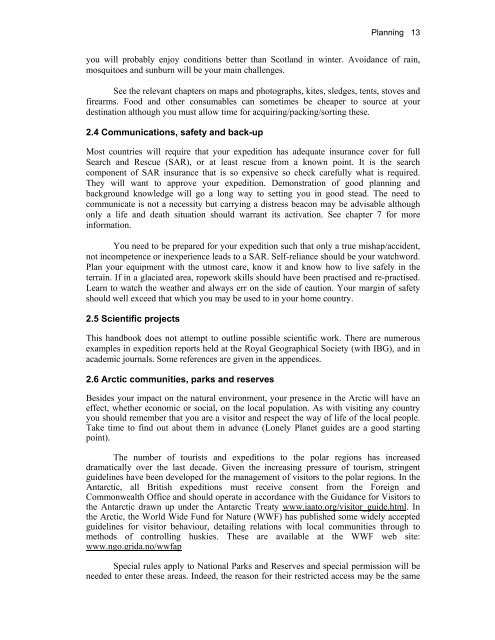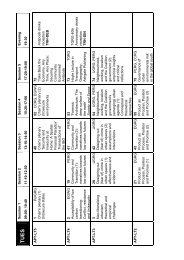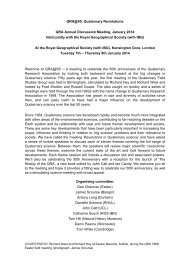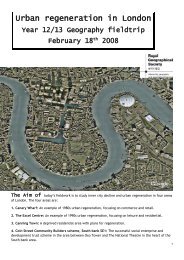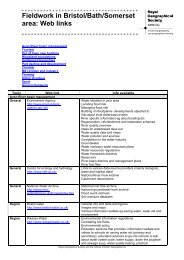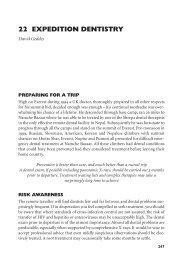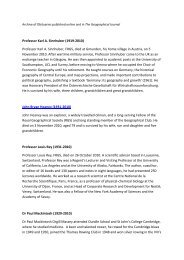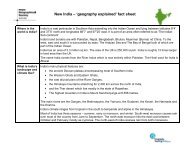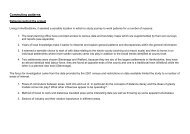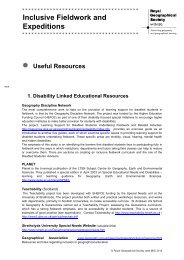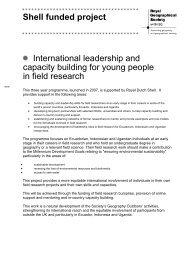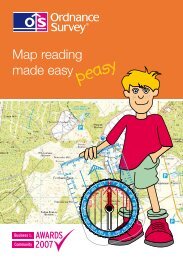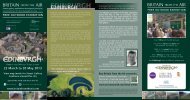Edited by Rachel Duncan 4th Edition ISBN 0-907649-91-2 London ...
Edited by Rachel Duncan 4th Edition ISBN 0-907649-91-2 London ...
Edited by Rachel Duncan 4th Edition ISBN 0-907649-91-2 London ...
Create successful ePaper yourself
Turn your PDF publications into a flip-book with our unique Google optimized e-Paper software.
Planning 13<br />
you will probably enjoy conditions better than Scotland in winter. Avoidance of rain,<br />
mosquitoes and sunburn will be your main challenges.<br />
See the relevant chapters on maps and photographs, kites, sledges, tents, stoves and<br />
firearms. Food and other consumables can sometimes be cheaper to source at your<br />
destination although you must allow time for acquiring/packing/sorting these.<br />
2.4 Communications, safety and back-up<br />
Most countries will require that your expedition has adequate insurance cover for full<br />
Search and Rescue (SAR), or at least rescue from a known point. It is the search<br />
component of SAR insurance that is so expensive so check carefully what is required.<br />
They will want to approve your expedition. Demonstration of good planning and<br />
background knowledge will go a long way to setting you in good stead. The need to<br />
communicate is not a necessity but carrying a distress beacon may be advisable although<br />
only a life and death situation should warrant its activation. See chapter 7 for more<br />
information.<br />
You need to be prepared for your expedition such that only a true mishap/accident,<br />
not incompetence or inexperience leads to a SAR. Self-reliance should be your watchword.<br />
Plan your equipment with the utmost care, know it and know how to live safely in the<br />
terrain. If in a glaciated area, ropework skills should have been practised and re-practised.<br />
Learn to watch the weather and always err on the side of caution. Your margin of safety<br />
should well exceed that which you may be used to in your home country.<br />
2.5 Scientific projects<br />
This handbook does not attempt to outline possible scientific work. There are numerous<br />
examples in expedition reports held at the Royal Geographical Society (with IBG), and in<br />
academic journals. Some references are given in the appendices.<br />
2.6 Arctic communities, parks and reserves<br />
Besides your impact on the natural environment, your presence in the Arctic will have an<br />
effect, whether economic or social, on the local population. As with visiting any country<br />
you should remember that you are a visitor and respect the way of life of the local people.<br />
Take time to find out about them in advance (Lonely Planet guides are a good starting<br />
point).<br />
The number of tourists and expeditions to the polar regions has increased<br />
dramatically over the last decade. Given the increasing pressure of tourism, stringent<br />
guidelines have been developed for the management of visitors to the polar regions. In the<br />
Antarctic, all British expeditions must receive consent from the Foreign and<br />
Commonwealth Office and should operate in accordance with the Guidance for Visitors to<br />
the Antarctic drawn up under the Antarctic Treaty www.iaato.org/visitor_guide.html. In<br />
the Arctic, the World Wide Fund for Nature (WWF) has published some widely accepted<br />
guidelines for visitor behaviour, detailing relations with local communities through to<br />
methods of controlling huskies. These are available at the WWF web site:<br />
www.ngo.grida.no/wwfap<br />
Special rules apply to National Parks and Reserves and special permission will be<br />
needed to enter these areas. Indeed, the reason for their restricted access may be the same


